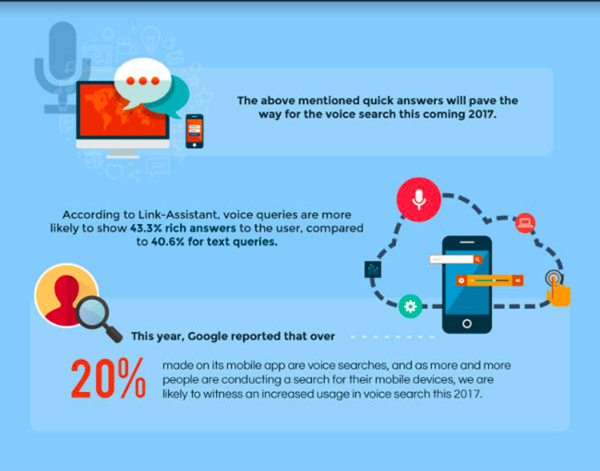Voice search and data: The two trends that will shape online marketing in 2017
As voice search and AI continue their rapid advance, columnist Jim Yu looks at how these technologies will change customer expectations and mold the future of marketing.
With the explosion of technology in the digital space, customer expectations and website capabilities are constantly changing. As we approach the middle part of 2017, now is a good time to closely examine trends that will have the greatest impact on the industry this year.
There are now more than a billion websites available, and the amount of data online has exploded from 130 exabytes in 2005 to an anticipated 40,000 in 2020. In response to the incredible amount of information available online, brands now compete with each other to provide customers relevant content. This has driven industry advancements and led to greater customer expectations from brands and their associated websites.
Advancements in voice search and artificial intelligence (AI) will drive rich answers that will help marketers understand the customer intent behind I-want-to-go, I-want-to-know, I-want-to-buy and I-want-to-do micro-moments. Google has developed algorithms to cater directly to the search intent of the customers behind these queries, enabling customers to find the right answers quickly.
With the advent of these new technologies, securing positions at the top of the Google SERP, such as through local 3-packs and Quick Answers, will likely become even more important for brand recognition and reputation.
Voice search increasingly impacts the mobile experience
For the past few years, marketers have discussed the explosion of mobile usage and how that has changed brand-consumer interactions. Now, another trend is gaining pace and showing no signs of slowing down: voice search.
Between 20 percent and 25 percent of queries on the Google mobile app and Android devices are already voice searches. A survey from 2015 also found that usage has been exploding, with 60 percent of voice search users reporting that they started using virtual assistant technology and voice commands in the past 12 months. Considering this growth, ComScore believes that by 2020, 50 percent of all searches will be voice searches.
The impact on search marketing

Source: MarketingProfs
As voice search continues to rise in popularity, the way in which consumers phrase queries is also shifting. Customers no longer insert key terms; they ask questions using full sentences to express themselves. This will undoubtedly impact optimization strategies as brands strive to be the most relevant.
When considering the rise of voice search, you cannot neglect to consider the shift in Google’s algorithm. In an increasing number of cases, the search engine has moved away from helping consumers find an answer to your query to just providing you with the answer itself. We have seen the rise of various rich answers at the top of the SERP that provide users directly with the information they need, thus eliminating the need for many to click off the SERP to the brand pages.
There are three main characteristics of voice search queries, according to Google:
- They are more likely to be about an on-the-go topic.
- They most likely will not deal with sensitive information.
- They generally do not include searches for websites that will require the user to have significant interaction.
In other words, the rich answers provided by Google will play an important role in voice search. The ability of brands to optimize and get their sites featured in these answers will dictate their visibility for a growing number of users.
Voice search and social media
Voice search is also finding a growing presence among the social media platforms. Facebook has begun to add some options for voice messages through its Messenger app and Android Auto, which allows customers to listen and reply to messages from friends on the app by controlling it through voice commands. As these capabilities become more popular and the technology improves its accuracy, it’s likely that voice control will spread to other major social media platforms.
With the simultaneous boost in both rich answers and voice search, much of search will likely become almost a conversation between the user and their device. Brands need to anticipate this shift and find a way to secure their own role within this discussion.
AI and personalization will dominate the buyer’s journey
In 2015, Google announced that it had added RankBrain to the algorithm, cementing the importance of AI in search. Now, it takes center stage for all digital marketers.
Throughout the remainder of the year, marketers should expect to see an increasing prevalence of AI in the development of websites. Brands will want to keep users engaged by demonstrating that they understand their needs and can address their concerns.
Personalization on websites serves as a fantastic means to accomplish this. In parallel, sites will become more responsive to customers’ past behaviors and purchases, providing a personalized experience that goes deeper than the superficial use of names to greet returning visitors. This level of personalization will be used to guide users from their first engagement with the brand until their purchase.
What AI will offer marketers
Machine learning will assist marketers in homing in on user intent once a new visitor arrives on the page. The algorithms will be able to analyze location, how users arrived on the site, where they visit, and other behavior patterns to understand this prospect’s position in the buyer’s journey, as well as the particular persona they likely embody.
The sites can then personalize this content, the products promoted and the resources featured to increase engagement throughout the buyer’s journey. Rather than sales professionals acting as the primary means of engaging customers, it will be websites that demonstrate the value of the brand and why customers need to make a purchase from this particular organization. Sales team members will become engaged with users closer to the end of the buyer’s journey.
Marketers themselves will likely also see a job transformation as machine learning and AI become more prevalent. As AI becomes increasingly capable of understanding visitor intent and therefore displays accurate information and engages personally with users, machine learning will help automate some activities in marketing. Professionals will shift more toward the creative side of the industry, while algorithms handle the parts of the job that can be done automatically.
Data and deep learning will be the differentiator that fuels success
As these trends begin to take shape and mold the future of marketing, there is one cornerstone that cannot be overlooked: data. We have been discussing the importance of the incredible amount of information available on the web for several years. Now, however, as the technology continues to improve, data has become the key differentiator between those who can successfully embrace these trends and those that get left behind.
Many organizations have begun to take advantage of the power offered by big data: 48 percent invested in this information in 2016, up 3 percent from 2015, according to Gartner. As brands begin to better understand how this data can be used within their marketing efforts and the value it can offer effective websites, this number will only continue to grow.
Personalization will be impossible without big data. This information allows algorithms and platforms to understand user motivations, behaviors and desires so that they can deliver a highly individualized experience. It will be used to understand the intent and needs of the customers.
The algorithms that interpret big data will also be responsible for understanding voice commands and retrieving the appropriate information for users. These will quickly become a prominent feature in both search engines and websites.
Conclusion
As the importance of AI grows, companies that can best interpret data and translate it into actionable insights will flourish. The algorithms that best understand big data and enable brands to enact powerful and accurate personalization will become essential players within the digital marketing space.
Evolving technology and maturing customer expectations are disrupting digital marketing techniques, and it’s vital to pay close attention to these emerging trends. Brands that remain at the forefront of their industries in 2017 are the ones that can incorporate the above ideas into their marketing strategies effectively.
Some opinions expressed in this article may be those of a guest author and not necessarily Marketing Land. Staff authors are listed here.
Marketing Land – Internet Marketing News, Strategies & Tips
(36)








